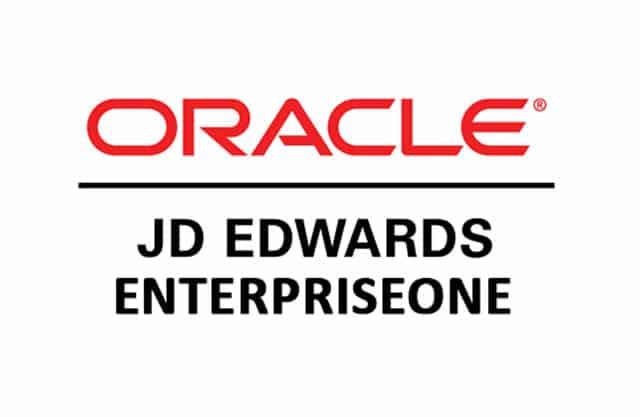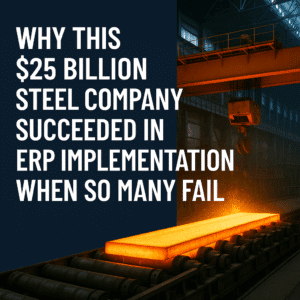JD Edwards’ Enterprise One is one of the most common ERP systems used in the mid-size manufacturing and distribution space. Since the 1990s, JD Edwards has invested heavily in the project, which has resulted in a robust customer base over the years.
Ever since Oracle acquired the company over a decade ago, there have been rumors of the demise of JD Edwards. Speculation has suggested that Oracle would eventually discontinue the product as a ploy to shift customers to Oracle eBusiness Suite, Oracle ERP Cloud, and other flagship products. Despite the industry rhetoric, this speculation has not materialized.
Table of Contents
ToggleThe end of the line for JD Edwards Enterprise One?
But has the time finally arrived? There are several reasons to believe that JD Edwards may be on its last leg. For example:
- Oracle acquired NetSuite a few years ago, leading some to wonder how long the company can support three major ERP products (NetSuite, ERP Cloud, and JD Edwards).
- The recent version 9.2 upgrade of Enterprise One was largely cosmetic, suggesting that the company is scaling back its R&D investments in the product.
- We have learned from a number of sales reps from Oracle and Oracle partners that Oracle is incentivizing NetSuite and ERP Cloud sales over that of JD Edwards.
- Other large vendors are forcing customers off legacy systems. For example, SAP is forcing a 2030 deadline for ECC and R/3 customers.
The company recently outlined a JD Edwards product roadmap to 2030. However, most of the more recent enhancements have been focused on things like an improved user interface, streamlined processes, and other incremental changes. Other top ERP vendors, on the other hand, are investing in more groundbreaking enhancements, such as machine learning, artificial intelligence, predictive analytics, and others.
In other words, it is becoming more likely that JD Edwards customers are bumping against a deadline to move from Enterprise One. Below are some tips on how to move forward if you are an existing JD Edwards customer or an organization considering a JD Edwards product.

Assess your culture and risk tolerance
First and foremost, it is important to recognize that 2030 is a long way away. Even once 2030 arrives – and assuming Oracle discontinues support for Enterprise One at that time – this isn’t the end of the world. It may not be the most innovative way to define your longer-term digital transformation strategy, but it could mean that staying the course is the right answer for now.
Before rushing to a decision to migrate away from JDE, it is important to assess and define your organizational risk tolerance. Some organizations have a low tolerance for risk, which may mean that the risk-reward of staying on JD Edwards for the next few years makes sense. For others with a higher tolerance for risk, they may find that replacing their back-office ERP system to a non-JDE product makes more sense. Different organizations will arrive at different answers that make the most sense for them.

Gap analysis with JD Edwards Enterprise One v9.2
Another important step is to conduct a gap analysis between your future state operational and technical needs and the capabilities of the most recent version of Enterprise One (v9.2). If this version meets your needs, there may be no need to rush to replace the system. If there are material gaps, then it may make sense to begin your roadmap to transition away from JD Edwards.
It is important to keep in mind that you want to conduct a gap analysis based on actual and current capabilities – not what Oracle says they might incorporate in future releases. It is also important to conduct an independent gap analysis of your needs against the backdrop of JDE’s strengths and weaknesses. For example, our team at Third Stage has the experience and quantitative tools to help you through this process.
Compare your alternatives to JD Edwards
Once you have a firm grasp on your risk tolerance and gap analysis of future needs relative to JDE’s capabilities, it is important to objectively compare your options. One common option is to stay on Enterprise One, which is more likely to be your lower cost and lower risk option – although it may also be the option more likely to result in lower business benefits and ROI.
Another option is to consider your other alternatives. For example, many of our clients on JDE consider SAP S/4HANA vs. Oracle ERP Cloud as an alternate path. These options may be of higher cost and higher risk in the short-term, but they have the potential to deliver more business benefits and ROI – especially in the long-term. These options may also address the inevitable, which is that most JDE customers will need to eventually move off of the platform eventually.
One more word of wisdom: recognize that migrating from JD Edwards to Oracle ERP Cloud is a reimplementation. Oracle sales reps may try to convince you that it is a relatively simple “upgrade,” but it is in fact essentially a reimplementation. It is important to objectively assess the time, cost, risk, and ROI of your various alternatives.
Define your long-term digital strategy and roadmap
The capstone to your assessment process should be to define your long-term digital strategy and roadmap. This assesses your preferred alternative to other options and lays out a multi-year transformation strategy and roadmap.
This should be an objective and realistic plan of how your organization will address the various components of your transformation strategy. This video explains some of the things to consider as you define your longer-term strategy and plan – regardless of which path you choose:

Next steps in your JD Edwards and digital transformation journey
We help a large number of JDE and Oracle customers navigate these and other critical decisions. It is important to objectively assess and define your path forward in order to be successful.
Please feel free to contact me to brainstorm ideas and discuss your options and path forward. I am happy to be a sounding board as you continue your digital transformation journey!





